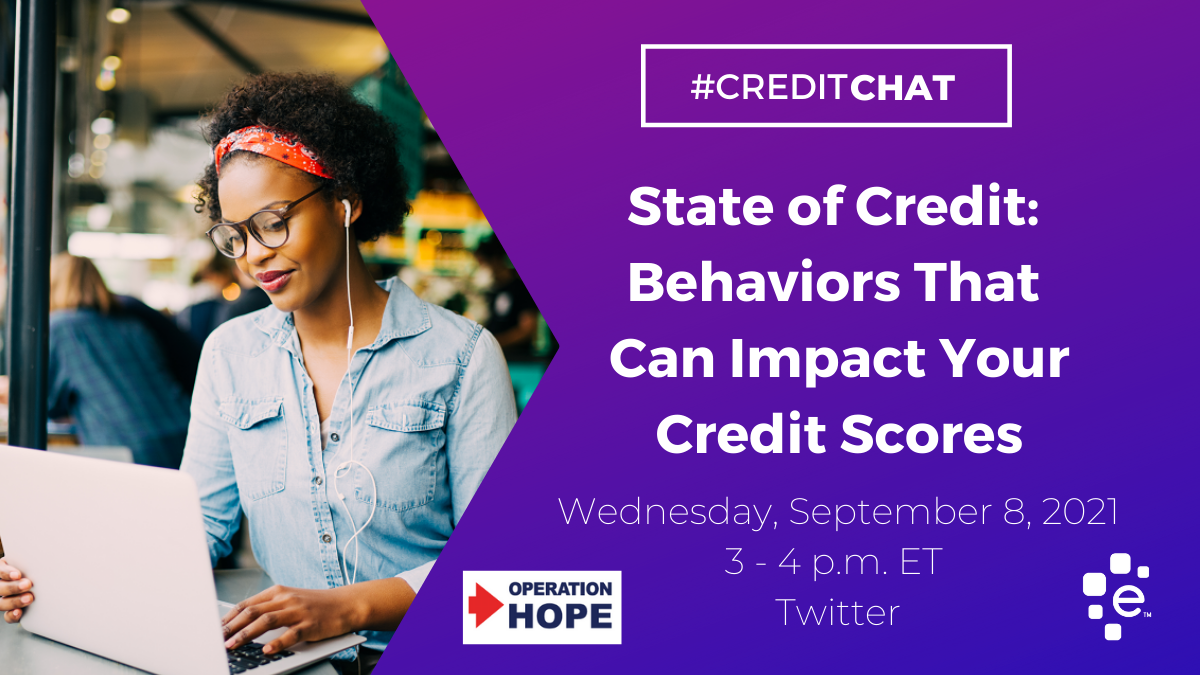State of Credit: Behaviors That Can Impact Your Credit Scores
 Our weekly #CreditChat started in 2012 to help our community learn about credit and important personal finance topics (e.g. saving money, paying down debt, improving credit scores). Each chat is hosted by @Experian on Twitter and all are welcome to participate. DM us any questions.
Our weekly #CreditChat started in 2012 to help our community learn about credit and important personal finance topics (e.g. saving money, paying down debt, improving credit scores). Each chat is hosted by @Experian on Twitter and all are welcome to participate. DM us any questions.
Today Experian will release its 12th Annual State of Credit Report in partnership with Operation HOPE. In this week’s chat we’ll discuss the findings of the study and some of the behaviors that can impact your credit scores.
Topic: State of Credit: Behaviors That Can Impact Your Credit Scores
When: Wednesday, September 8, 2021 at 3 p.m. ET.
Where: Join the live hashtag discussion.
The panel will include Operation HOPE; Leslie H. Tayne, Esq: Founder and Managing Director of Tayne Law Group, P.C. (f/k/a The Law Offices of Leslie H. Tayne, P.C.); Beverly Harzog: Credit Card Expert and Consumer Finance Analyst for U.S. News; Lawrence D. Sprung: CFP® President of Mitlin Financial, Inc.; Rod Griffin: Senior Director, Consumer Education and Advocacy, Experian and Christina Roman: Consumer Education and Advocacy Manager at Experian.
Gift Card Giveaway
Enter here for a chance to win a $50 Amazon gift card! We will be announcing a winner at the end of the chat. Entry Period: Raffle open now and closes at the end of this chat at 4 p.m. ET. Complete rules here.
Questions We’ll Discuss:
1. Experian’s 12th Annual State of Credit Report was just announced, do you think scores went up or went down in 2020?
2. The average U.S. credit score was 695 (a 7-point increase). Why is it important to check your credit at least once per year?
3. Where can you go to access your credit report and credit score for free?
4. As part of this year’s report, Operation Hope introduced a new resource: The HOPE Financial Wellness Index. Where do your state and city stand? www.operationhope.org/creditindex
5. What credit behaviors do you think made the biggest difference between the states with the highest and lowest credit scores?
6. Our State of Credit Report revealed that the average credit score jumped up 7 points in 2021. Did you make any financial changes that had a positive impact on your credit score last year
7. If you did not see an increase in your credit scores, what are some changes you can make moving forward?
8. The study looked at five different generations. Can you rank them by credit score, highest to lowest? (Boomer, Gen. X, Gen. Z, Gen. Y, and the Silent Generation)
9. Our report revealed positive credit score changes among our youngest consumers. How can we ensure we continue to drive positive financial behaviors for the youngest consumers?
10. You can’t always control certain economic factors, but how can you ensure that you are in control of your credit?
Check out our complete list of upcoming personal finance Twitter chats here.